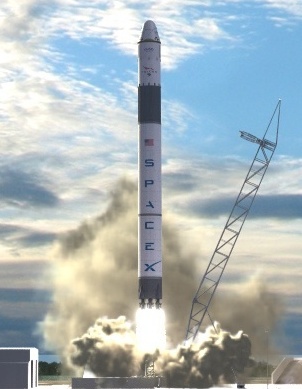
Elon Musk just announced a significant milestone for SpaceX and, well, humanity. The first live test of a Falcon 9 rocket boost stage landing vertically was a success. The first stage of the rocket returned to Earth and landed vertically in the Atlantic Ocean after boosting the second stage to a resupply mission with the International Space Station.
Sadly, this part of the rocket was lost to sea as SpaceX could not retrieve the rocket until two days after it “landed.”
Musk stated at a press conference today that all telemetry data indicates that the rocket soft-landed in the water with the legs deployed — as if it were landing on land. The end goal is to have a reusable rocket, one that can launch, land, and launch again. Musk says SpaceX foresees being able to land and relaunch a rocket on the same day.
The space transportation company has tried several times to retrieve rocket stages after launching, including using parachutes, but later switched to landing. This Falcon 9 soft landing came after extensive testing that included launching and landing a smaller version of the rocket called the Grasshopper.
According to Musk, the boost stage constitutes 70 percent of the cost of a rocket and by reusing this part of the rocket, it would reduce the cost by at least 70 percent. Plus, as Musk preaches, reusing rockets would reduce the impact on the environment since it would decrease the amount of rockets built. SpaceX charges $60 million to launch a Falcon 9.
SpaceX is currently building out several launch facilities in Texas and Florida. It’s modifying launch pad 39a at NASA’s Cape Canaveral facility which is where Apollo 11 launched from. The company is also fighting the U.S. Air Force over a contract with the Russian space agency. SpaceX has decided to file suit against the U.S. Air Force to get it to open up competition for national security-related rocket launches.
Source: TechCrunch
